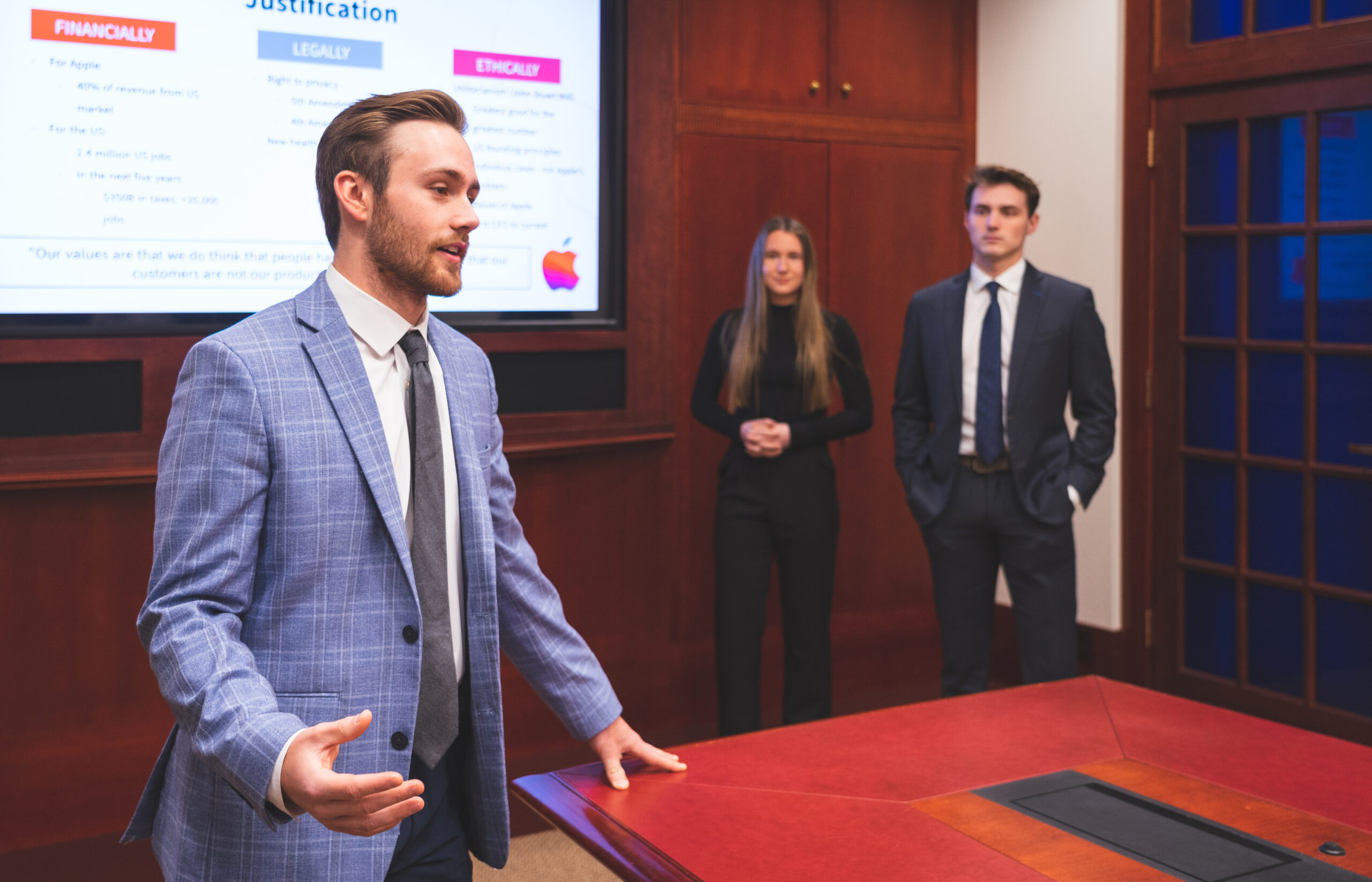Students debate current moral dilemmas through Lasallian lens
Lasallian students from across the U.S. are examining major ethical dilemmas facing today’s top largest technology companies in an annual Lasallian Societal Impact Case Competition — and this year Saint Mary’s team brought home the trophy for first place.
The real-world scenario is an opportunity to test students’ research and presentation skills, but also to get them thinking about the ethical component of various aspects of business today.
This year marked the competition’s second year, in which each of the six Lasallian colleges and universities in the United States put forward a small team of three to five students who present virtually and answer the tough questions posed by a panel of judges.
Brady Lindauer, then a senior double majoring in finance and business intelligence and data analytics has participated twice, last year during the event’s inaugural competition, and at this year’s event in mid April.
Last year the group focused on ethical situations within Facebook. The question was posed: Can ethics scale in the digital age?
“The ethical frameworks of the past are not as effective in something like Facebook, where you can jump online, do something unethical, and hide behind a screen,” he said.
Lindauer’s group outlined three different points of consideration: data privacy, antitrust, and content moderation.
In the end, when answering whether it is Facebook’s responsibility to monitor content or merely provide a platform, Lindauer and his team believed the mega business had a responsibility to monitor content, and argued that investors also want businesses to make positive contributions to society. He delved into the three largest owners of Facebook stock and found quotes from their CEOs about the importance of ethics.
This year’s topic had to do with another big name in the digital world, Apple, and the overarching theme was about privacy vs. safety.
Apple, out of respect for its consumers who value their privacy, won’t provide the government access to consumer’s data. But should they in instances of terrorist attacks or murders? It’s an ethical dilemma without an easy answer and teams were left to determine which position they would defend.
Saint Mary’s team of Lindauer, Jackson Nauss, and Maya Wachter made a case for consumer data privacy and brought home the crystal apple trophy. In the end, Lindauer said, it comes down to who can speak, present, and defend their ideas with valid evidence — and think on their feet when asked the tough questions.
Last year, Lindauer said he didn’t know much about the bigger Lasallian picture. Now he has a larger appreciation for how many schools are carrying the Lasallian mission into the world — but winning was still a priority. To take home the trophy when competing with big schools like La Salle University in Philadelphia, Manhattan College in Riverdale, N.Y., and Saint Mary’s College of Moraga, Calif., known for being a player in March Madness, was a big deal.
“It was a true honor to represent Saint Mary’s in this competition and to win was even cooler,” he said. “The win against the other Lasallian schools is a testament to the real-world education we receive at Saint Mary’s. Classes such as Strategic Management helped us learn to think critically and respond to difficult questions which set us apart from other schools.”
Lindauer already has a position lined up as a financial representative with Fidelity Investment. He said he’ll carry the ethical component forward.
“I’ll have a fiduciary responsibility to clients to do what is in their best interest, not in mine and what would make me the most commission,” he said. “Although I’m not going into the corporate environment, I can transfer the ethical piece of doing things in an ethically sound manner. That’s something Saint Mary’s stresses more so than other universities.”
Andrew Scott, associate professor of business and the team’s adviser, called the competition “a great opportunity to use what they’ve learned across the curriculum, and apply it to a real-life scenario that has implications for society and the world.”
“It’s something we’re skilled at in this department, providing students with practical experiences and project-based learning,” Scott added. “This gives students some talking points when working with recruiters and hiring managers. It’s not, ‘I scored well on that test,’ it’s ‘I can take those skills learned in the classroom and apply them to your organization.’ It does give our students a chance to practice what they’ve learned but moreover, an opportunity to display their mastery in a very meaningful way when they hit the job market.”
For caption: Jackson Nauss and Maya Wachter.
